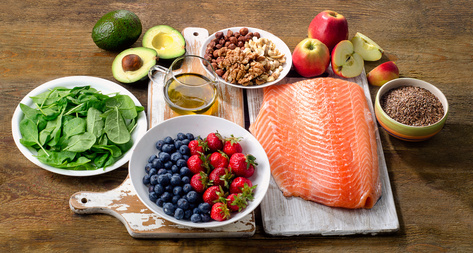You guys, I have to dedicate a post to a friend of mine, because I’m damn proud of her. Let’s call her Jenny*. I’ve known Jenny through in-town activities for about a year and a half. She’s probably one of the sweetest people you’ll meet – not that that has any relevance to her success, other than the fact that her attitude is awesome. She’s a single mom of two, and she’s busy. She came to me about 6 weeks ago and asked the question pretty much everyone asks as soon as they know I’m a dietitian: “Can you give me any tips for losing this weight?”
That’s always a loaded question, isn’t it? And I know every single dietitian out there has gotten this question, usually followed by something like “you must not eat any carbs” (this one makes me cringe the most), “you never eat dessert, do you?”, or “you’d freak out if you knew what I eat!” (Side-note: I eat a lot of carbohydrates because I understand metabolism, I eat dessert all the time, and unless you’re eating non-food items, nothing will shock me.) We still have so much room for public education…but I’m getting off track here.
Let’s get back to Jenny. Jenny is extra awesome because she didn’t follow up her question with any of those things. She just genuinely wanted to learn how to take better care of her body and fuel her system right. (Love her for it!) And I could absolutely help her with that.
Jenny is 5’5″ and had a starting BMI of 25.4, which put her into the overweight category, but just so. She worked out regularly, about 30 minutes a day Monday-Friday. She didn’t do anything to get her heart rate up while working out; she did mostly weight machines at moderate weight. The bottom line: she was burning very little energy while at the gym. So, A for effort, C- for reaping the potential benefits of spending the time. First opportunity for us to improve things: if you’re going to put in the time, maximize the return. Make it count.
Jenny’s daily energy expenditure (BMR coupled with her activity level) was somewhere between 2100 and 2200 kcals. Let’s review the very complex process for losing weight – are you ready? Pay close attention:
Put less calories in than are going out.

Boom! Wisdom imparted. My job is done. Ok, I kid. But not really. There is so much nonsense on the web about what food will make you gain weight (first it was anything that had fat, then anything with carbs, then only some carbs – white sugar, then back to all carbs…blah, blah, blah). It can make your head spin. The bottom line is and will always be basic energy balance. If you put in more fuel than your body uses, it will store it. The body’s most efficient way of long term energy storage is fat. A lot of calories can be packed into a relatively small space. Why wouldn’t your body put it there? It’ll be ready when the next famine sets in.
So yeah, we don’t have famines to deal with generally – thankfully. So that’s a problem in that process. We just keep packing in more and more. The way metabolism works hasn’t changed just because our energy availability has improved greatly. It is still a matter of more energy in versus what is going out (aka being used). Back to Jenny.
I’m not a fan of drastic caloric restriction, for several reasons. First, who wants to feel hungry?! I’d venture to say that no one does (I have zero scientific proof of this, but I’m sticking to it!). We are biologically programmed to address hunger with feeding our bodies. So even though we are humans and can play the “mind over matter” game and restrict our intake even when we’re feeling hungry, we tend to eventually snap, give in, and then overeat. Totally defeats the purpose. We end up suffering needlessly, only to eventually inhale the calories anyway.
Secondly, shocking the body into sudden caloric deprivation certainly works to make the weight go down quickly, but it’s not a long-term strategy. Anyone who has ever worked on losing weight likely noticed that the initial weight loss is quick and super encouraging. “Yay! I dropped 5 pounds in the first week!” (Let’s keep perspective here: this isn’t all fat. It’s a lot of water, some fat, and some waste. That means poop, in case that wasn’t clear.) After that the weight loss slows down because our body is smart. Its operating system will override our poor management of it. It responds to us restricting it below what it needs to live by slowing down its metabolism so it needs less to perform basic functions. Now it will be even harder to lose weight even though we are restricting calories. Oops, that wasn’t the goal.
I cut Jenny’s intake by 350 calories/day during the fat loss stage. Why only 350? It’s a reduction that won’t make her body freak out because of drastic cutting, and it still gives her enough to keep her from feeling hungry all day. Jenny has been fully committed from the start to making long-term, sustainable changes. Once she’s improved her body composition, I’ll work on bringing her back up with the eventual goal of having her maintenance level be above where she started.
Here’s the meal plan I gave her: eat food, not too much, mostly plants. (I quote Michael Pollan quite often.) Drink water. A lot. All day. That’s it. I didn’t restrict anything. I most certainly didn’t tell her to worry about entire food groups! I am of the belief that most people intrinsically know that fruits & veggies are a better choice than deep fried anything. I did tell Jenny to track her food to stay accountable to her caloric intake. She’s not a client who needed a day-by-day, meal-by-meal plan laid out for her. Those clients do exist, and when that’s required, that’s what I provide. But I’m after educating Jenny to take care of her own body, not after making her dependent on a meal plan. She’s a client where that works.

I addressed her activity level and gave her very basic instructions of expending an additional 250 kcals/day through exercise. I told her I don’t care what exactly she does, as long as it includes some cardio, some weight training, and some flexibility. We talked about when and how she can fit it in, and I pointed her in the direction of some great resources that will give her exactly what she needs on her schedule. The most important thing was to make the most of her workout time. We discussed heart rate and pushing her weight training (more free-weight and body-weight focused exercises, increasing weight, making safety the priority).
Remember that very complex weight loss equation I mentioned earlier? So let’s apply that:
- We are reducing what’s available to Jenny’s body by about 600 kcals/day (350 via reduced food intake and 250 via energy burned working out).
- Jenny’s body is going to go to its best energy storage facilities (her fat stores) and start emptying some of them because it has less calories available than it needs.
- That’s it. In versus out. Period.
It’s now about 6 weeks later. Jenny has lost 12 pounds. Twelve. Her BMI has dropped 1.2 points and she’s out of that “overweight” risk category. She’s got more energy. She hasn’t felt deprived. She’s drinking tons of water. She’s got her mom working out with her and is helping her pay more attention to what she’s eating. She sent me this text this morning:
“It’s made such a difference in so many areas of my life. I can’t thank you enough.”
I tell people all the time that the number on the scale is just one thing to pay attention to. What matters is how your body feels. Is it happy? Tired? Energized? Operating at its best? Feeling sluggish? Do you feel good in it?
I am so proud of my friend. She’s been a model client in that she has been committed and motivated. It doesn’t mean she hasn’t had obstacles. Her life still continued. Her kids still demand a lot of her, like kids tend to do. But she’s looking at the long-term picture of wanting to feel better. The number on the scale is just one measure. Seeing how happy and proud of herself Jenny is is the best gauge for me.

*Her name is obviously not Jenny. But she deserves her privacy, so don’t worry about her name!

